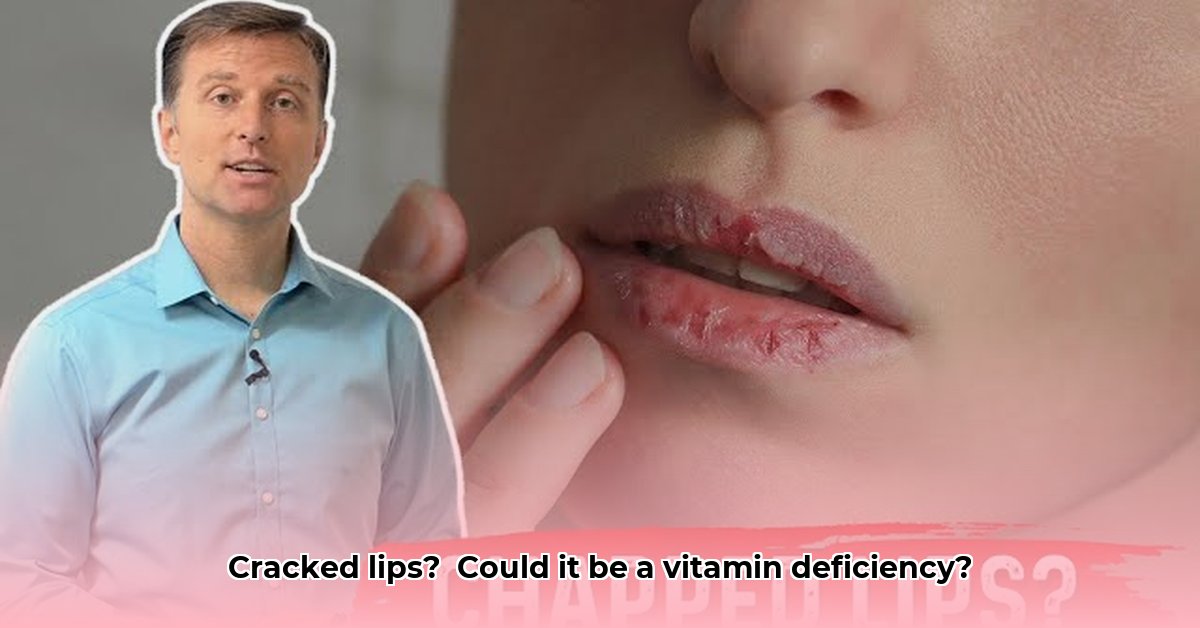
Eish, those chapped lips! They're not just uncomfortable; they could be a sign your body needs some extra attention. This guide explains why your lips might be dry, which vitamins and minerals can help, and provides practical solutions to get them back to their soft, smooth best. Whether you need quick relief or long-term solutions, we’ve got you covered.
Understanding What's Behind Those Dry Lips
Dry lips are often a result of a few factors working together. Sometimes, it's simply not drinking enough water. Your lips are like little sponges – they need constant moisture to stay plump. However, it can also indicate a potential vitamin or mineral deficiency. Specifically, deficiencies in B vitamins (B2, B3, B6, B7, and B12), zinc, iron, and vitamin C are frequently linked to dry, cracked lips. A lack of these essential nutrients could lead to inflammation, dryness, and cracking.
There’s some debate about vitamin A’s role. While some believe excessive vitamin A from supplements or harsh creams might contribute to dry lips, more research is needed to confirm this.
Beyond nutrition, environmental factors play a significant role. Harsh weather, strong sun, and even certain products you use can all dry out your delicate lip skin.
Figuring Out What’s Going On
If your lips are only slightly dry, simple home remedies might suffice. However, persistently cracked, bleeding, or painful lips warrant a visit to your doctor. They can rule out any underlying health conditions, such as an allergic reaction or thyroid problems, and check for vitamin or mineral deficiencies. A proper diagnosis is crucial for effective treatment.
Your Personal Lip Rescue Plan: A Step-by-Step Guide
Let's get those lips feeling better! Here's your action plan:
Hydration is Key: Aim for at least eight glasses of water daily. Think of it as your daily lip-hydration ritual! Proper hydration benefits your entire body, including your lips. Is your water intake sufficient?
Food is Your Friend: Eat foods rich in B vitamins, zinc, iron, and vitamin C. Think leafy greens (spinach, kale), citrus fruits (oranges, lemons), lean meats (chicken, fish), nuts, and seeds. These are your allies against dry lips. Did you know that a balanced diet can significantly improve lip health? Before taking supplements, consult your doctor.
Choose Your Lip Balm Wisely: Select balms containing humectants (attract moisture), occlusives (seal in moisture), and emollients (soften and smooth). Avoid mineral oil, as it can worsen dryness. Many effective options are available.
Protect Your Pout: Shield your lips from sun, wind, and cold with a lip balm containing SPF 30 or higher. This is especially crucial during harsh weather. Protecting your lips from the sun is just as important as protecting your skin.
Allergen Awareness: Be mindful of potential irritants in toothpaste, makeup, and food. Identify and avoid any triggers. If you notice a pattern, act immediately!
How to treat dry lips caused by vitamin A excess from topical retinoids: If you suspect your topical retinoid use contributes to lip dryness, consider lowering its application frequency, using a milder formulation, or incorporating a richer moisturizer. A dermatologist can help you strike a balance.
Long-Term Strategies for Healthy Lips
Maintaining healthy lips is an ongoing commitment. Stay hydrated, protect your lips from environmental stressors, and use a protective lip balm regularly. A balanced diet and regular check-ups help maintain your overall health, including your lip health.
Possible Causes and Solutions: A Quick Summary
| Factor | Likelihood | Impact | Solution |
|---|---|---|---|
| Dehydration | High | Moderate | Increase water intake |
| Vitamin/Mineral Deficiencies | Moderate | High | Dietary changes, supplements (with doctor's advice) |
| Allergic Contact Cheilitis | Moderate | Moderate | Identify and avoid irritants |
| Sun Exposure | High | Low | Use lip balm with SPF |
Remember, healthy lips are part of your overall well-being. Addressing underlying issues is crucial for lasting relief from dry, chapped lips. What steps will you take to improve your lip health?
Key Takeaways:
- Dry lips have multiple causes, from dehydration to vitamin deficiencies.
- Proper hydration and lip care are essential.
- Certain deficiencies might contribute, but more research is needed on vitamin A's role in dry lips.
- Addressing underlying medical conditions is crucial for persistent dryness.
- Choose lip balms carefully, avoiding irritants.
- Consult a healthcare professional for chronic or severe dry lips.